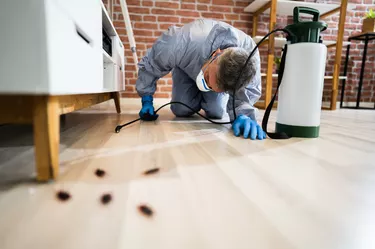
If you just signed a lease and found roaches, don't be too hasty to get out of your lease even though it's an uncomfortable situation. If you allow the landlord to address the issue, you may find that she will fix the problem immediately. If that's not the case, however, your landlord, not you, breaks the lease when she allows an unsafe dwelling, and in most cases you can move out without legal or financial penalties.
Keeping a Record of Incidents
Video of the Day
Keep a record of each time you see cockroaches or evidence of them, as well as each time you speak to your landlord about the problem. Collect roach droppings and exoskeletons. As unpleasant as it may be, if you should have to take your case to court, this evidence will help you prove that your landlord was not maintaining a safe living environment.
Video of the Day
Trying to Solve the Problem Informally
Schedule an appointment with your landlord or property manager and tell them you just signed a lease and found roaches. If possible, do this face to face, not over the phone so that you can be sure there is no intercommunication. Politely and clearly explain that your apartment has been invaded by cockroaches and describe the severity of the problem. Present the evidence you gathered if need be.
Ask your landlord or property manager when she will be taking care of the issue and explain why you feel the time she has specified is not soon enough, if this is the case. If the property manager does not seem interested in helping, contact your landlord directly. The problem may not be your landlord; she may simply be unaware that your property manager is not doing his job.
Record the date and time of all discussions and who they were with: maintenance, property manager or landlord.
Writing a Written Request
Place your complaint in writing if the landlord does not respond after you have discussed the problem in person. Date the letter and make it professional, clear and unemotional. Describe the cockroach problem, including where the cockroaches or evidence of them was seen and whether it has gotten worse. Mention the date and time of the face-to-face discussion you had, as well as any other subsequent conversations.
If a deadline to exterminate was missed, mention this. Request that action be taken in a timely manner and keep a copy of this letter, as well as the date you mailed it for your records.
Taking Legal Action
If you've just signed a lease and found roaches but the landlord won't help you, review your state lease laws, consult an attorney and contact your local health department. Lease laws differ from state to state, so before you move out or seek to have the health department conduct an examination that will classify the property as unsafe, review the laws that pertain to your state and locality.
Consult an attorney to ensure you have understood the laws properly and will be safe from any fines or fees should your landlord sue you. Most counties have resources where you can get free legal help from law students or volunteer attorneys if you cannot afford to pay.
Take the record you prepared in with you to your meeting. Contact your local health department and ask it to do an inspection. If it finds roaches, your landlord will be required to clean up. The inspection will also serve as evidence that your landlord, not you, broke the lease by providing an unsafe environment should he sue you.